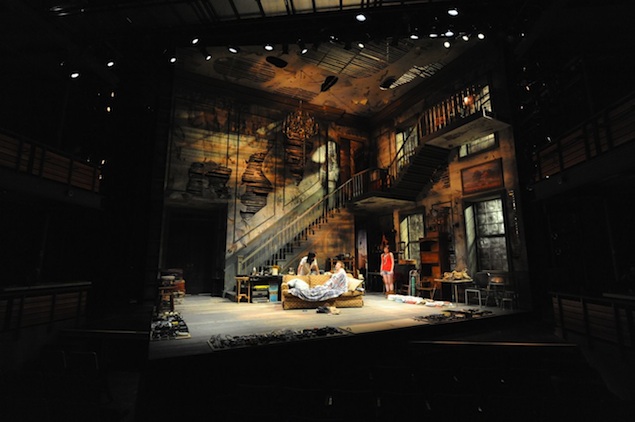
The play might be titled Appropriate after a adjective its characters utter as a constant refrain, but there’s another word that lingers long after the lights go up. Each member of the Lafayette family, returning home to a moldering Arkansas plantation to pack things up after the death of their patriarch, is warped in some way—thanks to the legacy of an unseen father who’s as much as presence onstage as any of them, and whose dark spirit seems to contaminate his descendants all the more the longer they stay there.
Appropriate is Washington-raised emerging playwright Branden Jacobs-Jenkins’s homage to the Southern family dramas of yore, from Tennessee Williams and Horton Foote to the more recent horrors of the Weston family in Tracy Letts’s August: Osage County. Set designer Clint Ramos has constructed a spectacularly vast and spooky set that seems to be disintegrating by the minute, with grand staircases leading up to heaven past rotting walls and piles of crap everywhere that make the space feel a lot like an episode of Hoarders. Sweet Home Alabama it ain’t.
Returning home to this decaying manse are Beauregarde “Bo” Lafayette (David Bishins); his bitter sister, Toni (Deborah Hazlett); their younger brother, Frank/Franz (Tim Getman); and the three siblings’ respective spouses and children. Bo’s wife, Rachael (Beth Hylton) is a type-A New Yorker who fusses constantly over their children, Cassidy (Maya Brettell) and Ainsley (Colde Edelstein). Toni’s son Rhys (Josh Adams) has recently gotten into trouble for selling prescription pills at school (we find out very briefly and somewhat unsatisfactorily that a kid died). And Frank, the black sheep of the family who’s quickly dismissed as a “pedophile” by his siblings, is engaged to a 23-year-old hippie named River (Caitlin McColl), whose joyful and positive spirit makes the moody, self-seeking Lafayettes appear even more vile.
The siblings bicker among themselves in the way that families do over who took care of their father the longest, who shelled out the most money, and who’s worked the hardest to pack up his festering trash heap of a house, and Jacob-Jenkins proves how astutely he can capture the petty quarrels that splinter families. But most of the action revolves around an album of obscene photographs of black corpses found early in the play. The presence of the images both exposes and infects the family: Toni, who’s been in the house the longest, seems relatively undisturbed by them, while Bo immediately wonders how much he can sell them for. Frank, who’s perhaps guiltiest of the worst crimes but who seems the most eager for redemption, is the lone Lafayette who wants to get rid of them altogether.
Director Liesl Tommy deserves credit for the play’s impeccable timing—a scene with Rhys gazing inscrutably at the photos while alone on the couch is exquisite in its quiet pacing, and the show’s longer second act never drags. But so much comes in the way of revelation in the first few scenes that little is left to shock the audience as the play moves towards its conclusion, although little Ainsley appears at one point in a moment that genuinely jars. The sense of contamination within the house is emphasized constantly: There’s a graveyard right outside that’s repeatedly referenced by the characters as affecting the sale of the property, and the lake outside is described as algae-and bug-ridden.
It’s hard to imagine a group of actors delivering better performances in such unsympathetic roles. As Bo, Bishins comes across both as a callous, greedy corporate shill and as a man truly tormented by the legacy of his childhood. Hylton is funny and aggressively practical as Rachael, and Brettell really shines as a young actor playing the complex, unstereotypical teenage Cassidy. It’s Hazlett’s Toni who seems the most beyond redemption, given the gleefully cruel barbs she spits at everyone in her path, and the malevolence with which she stirs up problems for her siblings. (She also invites Rhys to share her bed in a fleeting moment that Jacobs-Jenkins uses to hint at, if not exactly spell out, trouble.)
Getman has perhaps one of the trickiest characters to flesh out in Frank, who comes across as likable and sweet even when Toni tells his horrified fiancée about his history of sleeping with underage girls. “You can always, you know, rewire yourself if you want to,” says Frank to Rhys after one gloomily funny misunderstanding late at night. As the play emphasizes, it isn’t that easy—Cassidy and Rhys both leave the house with souvenir fragments of its malign influence, hinting that the dark Lafayette family secrets haven’t been buried just yet. After all, in a play this uncomfortably real, a happy ending just wouldn’t be appropriate.
Appropriate is at Woolly Mammoth through December 1. Running time is about two hours and 20 minutes, including one intermission. The show contains adult themes and scenes of a sexual nature. Tickets ($35 to $75) are available via Woolly’s website.















